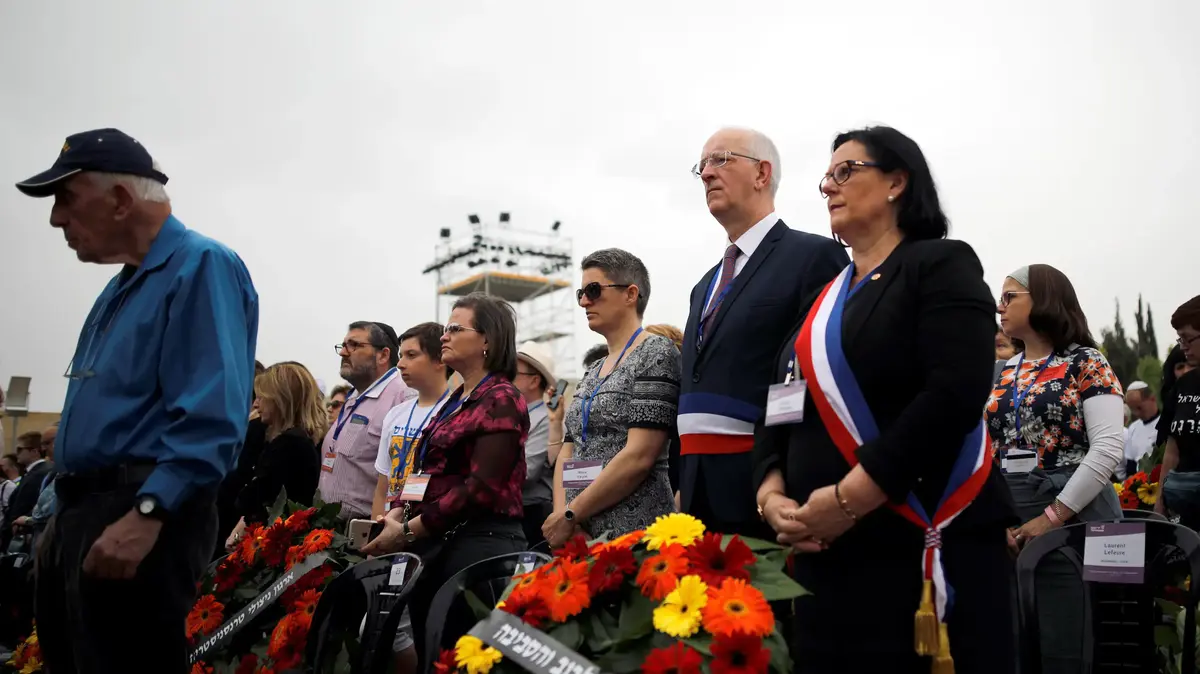Sentence
additional subjects
And after the Holocaust Day ceremonies are over - what will happen?
Holocaust Remembrance Day is not only ceremonies held once a year, but also the social responsibility of every citizen in Israel.
Opinion column
Tags
Holocaust and Heroism Day
Attorney and notary David Friend, in association with Legal Zap
Thursday, 08 April 2021, 09:41 Updated: 09:45
Share on Facebook
Share on WhatsApp
Share on general
Share on general
Share on Twitter
Share on Email
(Photo: Reuters)
Every year on Holocaust Remembrance Day, important state events are held throughout the country, with the aim of honoring the memory of the victims and increasing awareness of the survivors and the atrocities that took place.
The main value of state events of this kind is not in their very existence, but in the consciousness, heritage and social responsibility they create among the public, with an emphasis on the younger generation.
It is not enough for these values to take place in the ceremony itself, but it is required that they have social continuity.
Unfortunately, I'm afraid it's missing out.
Their story is our story
This year we come to Holocaust Day when we are (hopefully) at the end of the Corona plague, a dramatic event on a world scale, which still dictates the agenda of many countries in the world, who bury their dead daily and are in great distress.
For many of us it was a time of existential anxiety, social distress and difficulties in employment and livelihood.
The situation requires us to be more sensitive to survivors, because it is much more difficult for them, and it is not just a symbolic matter.
Many of the survivors living with us lead difficult lives, and over the years the situation has only become more difficult.
Our social responsibility is to try to facilitate, to participate, to help.
Understand that their story is also our story, and that we too have a responsibility to deal with past events.
Part of our responsibility is to convey and impose a national lesson and a universal lesson, in order to prevent a situation in which such events could occur again, God forbid.
Another important part is to understand that we live in the same society with the survivors, and that it is our job to help them.
Assisting Holocaust survivors, and older people in general, is not just a "government role," but a responsibility of society as a whole.
The role of government in facilitating the lives of survivors
Of course, I will not absolve the government of responsibility either.
There are definitely things she can do for Holocaust survivors.
Not only direct resources and increase budgets (a matter that is more difficult to implement in a time of crisis), but also facilitate them and the process of exercising the rights they deserve, and save bureaucracy.
I have warned about this many times in the past, and I find myself repeating things over and over again, but as long as the problem has not been fixed, I can not resist on the pretext that "I have already said", and I must go back and flood the matter.
The bureaucratic awkwardness hurts Holocaust survivors and makes it very difficult for them to get what they deserve.
Some despair during the process and receive only some of their rights, and even those who persevere and insist are forced to go through an unnecessary journey of unnecessary suffering.
It is difficult for them as well.
The latest example of this is the corona grants, which are distributed through the Claims Conference.
The same body has a partial list of those eligible and the Holocaust Survivors' Rights Authority has another list, and instead of simply transferring these funds to Holocaust survivors, they are again required to fill out forms upon forms.
In my opinion, without any real need, but only as a burden.
The awkwardness I am talking about is the result of additions upon additions, created over the years in the rights system, instead of all the rights being rearranged together.
These are "archeological layers" of regulations and legislation.
Every now and then they try to improve and add rights, but this is always done in part, and without seeing the big picture.
Although the additions help some of the survivors, many Holocaust survivors "lose their hands and feet" in the bureaucratic tangle, and find it difficult to improve their situation.
Our part as a company
I believe that if we as a society know how to do our part and become aware of Holocaust survivors and older people in general, then the government and politicians will be more committed to them.
At the end of the day, politicians neglect what does not interest the public, so it is important to show that we are also interested in Holocaust survivors.
Thus, the government will have no choice but to give its share as well.
The writer is the head of David Friend - law firm and notary, specializing in the rights of and compensation to Holocaust survivors in Israel and abroad.
Locate Department David Friend - Ministry Aorcin Notary
Phone: 0737780042
Article courtesy of Zap legal
information presented in the article does not constitute legal advice or a substitute for it and does not constitute Recommendation for taking proceedings or avoiding proceedings, anyone who relies on the information in the article does so at his own risk.
Share on Facebook
Share on WhatsApp
Share on general
Share on general
Share on Twitter
Share on Email

